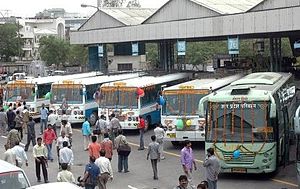
The Delhi Transport Corporation(DTC) is a public sector passenger road transport corporation that manages bus services in Delhi, India. It was incorporated in November 1971 as a wholly-owned corporation of the Government of India to provide an efficient, economical and properly coordinated road transport service in Delhi. Its administrative control was transferred to the Department of Transport, Government of Delhi with effect from 5 August 1996.
The Mudrika Seva is one of the most popular bus routes in Delhi, India. It was started by the Delhi Transport Corporation (DTC) in May 1974, and is now operated by both the Corporation and DIMTS' cluster buses. The service runs on Delhi's inner ring road, with major stops at AIIMS, Lajpat Nagar, Sarai Kale Khan, ITO, Delhi Gate, Kashmere Gate, DU North Campus, Model Town, Azadpur market, Shalimar Bagh, Punjabi Bagh, Britannia Factory, Rajouri Garden, Naraina, and DU South Campus.
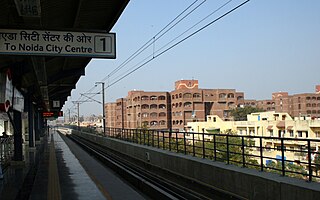
Mayur Vihar is an upmarket residential area on the periphery of Delhi, located in East Delhi, close to the city's Noida-Delhi border, situated just across the Yamuna River, and is divided into three distinct phases (sectors). As the name suggests, it has been the dwelling (vihar) of peacocks (mayur). Even today, the area has a closed sanctuary dedicated to the conservation of peacocks.

Delhi has significant reliance on its transport infrastructure. The city has developed a highly efficient public transport system with the introduction of the Delhi Metro, which is undergoing a rapid modernization and expansion since 2006. There are 16.6 million registered vehicles in the city as of 30 June 2014, which is the highest in the world among all cities, most of which do not follow any pollution emission norm, while the Delhi metropolitan region has 11.2 million vehicles. Delhi and NCR lose nearly 42 crore man-hours every month while commuting between home and office through public transport, due to the traffic congestion. Therefore, serious efforts, including a number of transport infrastructure projects, are under way to encourage usage of public transport in the city.
In India, an Inter State Bus Terminal or Inter-State Bus Terminus (ISBT) is a bus terminus that provides bus service to destinations located in other states. An ISBT may also provide bus services to destinations in the same state. Mostly ISBT Term is used in the Northern Part of India, In the western part of India, ST Stand or State Transport Term is used.
Kabir Nagar is a borough of the town of Babar Pur in North East Delhi district, Delhi, India. Kabir Nagar is known for jeans stitching work, which began in the 1990s. There are many small jeans manufacturing units. Kabir Nagar is a part of the Babarpur constituency and currently the incumbent MLA is Gopal Ray.

Bhajanpura is a residential area in the North East District of Delhi, India, 4 kilometres (2.5 mi) from Shahdara and 10 kilometres (6.2 mi) from old Delhi railway station. It is a highly populated portion of the Trans Yamuna area. Bhajanpura is around 5 kilometres (3.1 mi) from North campus and 8 kilometres (5.0 mi) from ISBT Kashmiri Gate, Shastri Park Metro Station. The area is currently used for commercial activities and is very well suited for residential purposes.
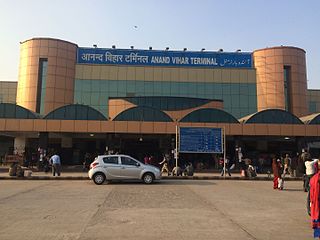
Anand Vihar Terminal is a railway station on the Indian Railways network, located in the Anand Vihar locality of Delhi, India. It is under the administrative control of the Delhi Division of the Northern Railway zone of Indian Railways.
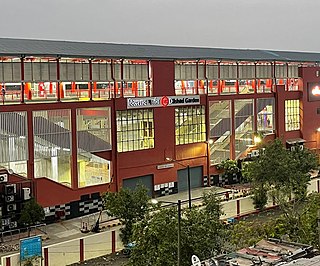
The Dilshad Garden metro station is a station of the Red Line of the Delhi Metro. It was the terminal station of the Red Line till 7 March 2019.

Kashmere Gate, also known as Kashmiri Gate, is a key metro station on the Delhi Metro network. It features a unique design with an elevated structure for the Red Line and underground facilities for both the Yellow and Violet Lines. As a transfer station, it connects the Red Line at the highest upper level with the Yellow Line at the lowest underground level and the Violet Line on a parallel underground level, facilitating seamless inter-line connectivity.

Anand Vihar is an interchange metro station located on the Blue and Pink lines of the Delhi Metro. Anand Vihar served as the terminus of the Blue line until July 13, 2011. The station is situated in the locality of Anand Vihar, near the interstate border between Delhi and Uttar Pradesh, and functions as a major connectivity hub for East Delhi. It is seamlessly integrated with the Anand Vihar ISBT and the Anand Vihar Terminal of Indian Railways. The upcoming RapidX station at Anand Vihar will further enhance connectivity, providing faster transit options to neighbouring cities and boosting intermodal transportation links in the region.
Badarpur is a historical town situated in the South East Delhi district of National Capital Territory of Delhi, India. The area of Badarpur encompasses both an NTPC thermal power station and an ancient village known as Badarpur village.The village has mostly Gujjars, Baniya, Pandat Caste. As per Survey Citizens of Delhi NCR region mostly prefer the area situated in Delhi and nearby to major NCR cities Which provides them quick access to industrial hubs. For Example;- Anand Vihar, Dilshad garden, Dwarka, Sarita Vihar, and Badarpur along with nearby area. Badarpur in Delhi located at proximity to both Faridabad and Noida which makes it the best area in Delhi for People who have Jobs in above mentioned cities.
Kaushambi, a part of the planned industrial city of Ghaziabad, is an industrially planned and well developed region, under Vasundhara Zone of Ghaziabad Municipal Corporation. Situated at the sidelines of the Delhi-U.P. border opposite side of Anand vihar in Delhi that provides quick access to the capital city. Although not large, the city holds a conglomerate of various facilities, such as a shopping complex, movie theaters, city parks, company offices, computer education, robotics training and housing societies. Being part of the most populous state of India, it receives a good number of visitors and locals. The incumbent Chief Minister of Delhi Arvind Kejriwal, resided in Girnar Apartments of Kaushambi before shifting to Delhi when Aam Aadmi Party won the 2015 Delhi Elections.

Delhi Integrated Multi-Modal Transit System (DIMTS) Limited is a transport consultancy and infrastructure development company. It is a joint venture company of Government of National Capital Territory of Delhi (GNCTD) and IDFC Limited
The Veer Hakikat Rai Interstate Bus Terminus, previously referred to as the Sarai Kale Khan Interstate Bus Terminus, is one of the three Inter State Bus Terminals in Delhi. It operates short and long-haul bus services between Delhi and the neighbouring states of Haryana, Uttar Pradesh, and Rajasthan.

The Maharana Pratap Interstate Bus Terminus (Maharana Pratap ISBT), popularly known as Kashmere Gate Interstate Bus Terminus (Kashmere Gate ISBT), located in Delhi, is the oldest and one of the biggest Inter-State Bus Terminals in India. It operates bus services between Delhi and the neighbouring states and union territories of Haryana, Jammu and Kashmir, Ladakh, Punjab, Himachal Pradesh, Uttar Pradesh, Rajasthan and Uttarakhand. Spanning about 5.3 acres, it handles over 1,800 buses a day.

The South Extension metro station is a station located on the Pink Line of the Delhi Metro. The station was opened on 6 August 2018. South Extension metro is situated on the Ring Road and metro station will serve both part I and II of South Extension. It also connects the two neighbouring shopping districts of South Extension through a pedestrian overbridge on the inner ring road.

The Bhikaji Cama Place metro station is located on the Pink Line of the Delhi Metro. The station was opened on 6 August 2018. Bhikaji Cama Place Metro Station is situated on the Ring Road. It is named after Bhikaji Cama, an Indian freedom fighter, who is credited with creating an early version of the Flag of India based on the Calcutta Flag.
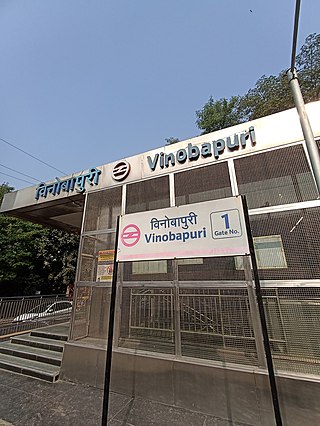
The Vinobapuri metro station is located on the Pink Line of the Delhi Metro. The station was opened for public on 31 December 2018.
Bijwasan railway station, on Delhi–Jaipur line lies immediate southwest of Delhi's main airport the IGI Airport, in Bijwasan in South Delhi in India. The station, part of Delhi Suburban Railway, is being upgraded to the world class regional multimodal interchange for the IGI airport by 2024. It will connect to the Haryana Orbital Rail Corridor in south at Patli railway station. It will be the major railway connectivity hub for the IGI Airport along with the Aerocity connectivity hub.
